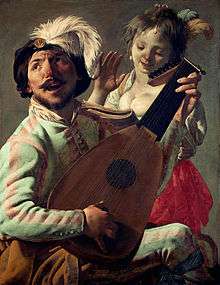Definify.com
Webster 1913 Edition
Lute
Lute
,Noun.
[L.
lutum
mud, clay: cf. OF. lut
.] 1.
(Chem.)
A cement of clay or other tenacious infusible substance for sealing joints in apparatus, or the mouths of vessels or tubes, or for coating the bodies of retorts, etc., when exposed to heat; – called also
luting
. 2.
A packing ring, as of rubber, for fruit jars, etc.
3.
(Brick Making)
A straight-edged piece of wood for striking off superfluous clay from mold.
Lute
,Verb.
T.
[
imp. & p. p.
Luted
; p. pr. & vb. n.
Luting
.] To close or seal with lute;
as, to
lute
on the cover of a crucible; to lute
a joint.Lute
,Noun.
[OF.
leut
, F. luth
; skin to Pr. laút
, It. liúto
, leúto
, Sp. laúd
, Pg. alaude
; all fr. Ar. al‘ūd
; al
the + ‘ūd
wood, timber, trunk or branch of a tree, staff, stick, wood of aloes, lute or harp.] (Mus.)
A stringed instrument formerly much in use. It consists of four parts, namely, the table or front, the body, having nine or ten ribs or “sides,” arranged like the divisions of a melon, the neck, which has nine or ten frets or divisions, and the head, or cross, in which the screws for tuning are inserted. The strings are struck with the right hand, and with the left the stops are pressed.
Lute
,Verb.
I.
To sound, as a lute.
Piers Plowman
. Keats
. Lute
,Verb.
T.
To play on a lute, or as on a lute.
Knaves are men
That
That
lute
and flute fantastic tenderness. Tennyson.
Webster 1828 Edition
Lute
LUTE
,Noun.
An instrument of music with strings. It consists of four parts, viz; the table, the body or belly which has nine or ten sides, the neck, which has nine or ten stops or divisions marked with strings, and the head or cross. In the middle of the table there is a passage for the sound. There is also a bridge to which the strings are fastened. The strings are struck with the right hand, and with the left the stops are pressed.
LUTE
,Definition 2026
lute
lute
English

A man playing a lute
Noun
lute (plural lutes)
- A fretted stringed instrument of European origin, similar to the guitar, having a bowl-shaped body or soundbox; any of a wide variety of chordophones with a pear-shaped body and a neck whose upper surface is in the same plane as the soundboard, with strings along the neck and parallel to the soundboard.
Related terms
Derived terms
Derived terms
References
- 2004. Musical Instruments: History, Technology, and Performance of Instruments. Murray Campbell, Clive A. Greated, Arnold Myers. Pg. 285.
Translations
stringed instrument
|
|
See also
Verb
lute (third-person singular simple present lutes, present participle luting, simple past and past participle luted)
- To play on a lute, or as if on a lute.
- Tennyson
- Knaves are men / That lute and flute fantastic tenderness.
- (Can we find and add a quotation of Piers Plowman to this entry?)
- (Can we find and add a quotation of Keats to this entry?)
- Tennyson
Etymology 2
From Old French lut, ultimately from Latin lutum (“mud”).
Noun
lute (plural lutes)
- Thick sticky clay or cement used to close up a hole or gap, especially to make something air-tight.
- A packing ring, as of rubber, for fruit jars, etc.
- (brickmaking) A straight-edged piece of wood for striking off superfluous clay from mould.
Verb
lute (third-person singular simple present lutes, present participle luting, simple past and past participle luted)
- To fix or fasten something with lute.
- 1888, Rudyard Kipling, ‘A Friend's Friend’, Plain Tales from the Hills, Folio Society 2005, page 179:
- To protect everything till it dried, a man […] luted a big blue paper cap from a cracker, with meringue-cream, low down on Jevon's forehead.
- 1888, Rudyard Kipling, ‘A Friend's Friend’, Plain Tales from the Hills, Folio Society 2005, page 179:
Anagrams
Lower Sorbian
Pronunciation
- IPA(key): /ˈlutɛ/
Adjective
lute
- nominative singular neuter of luty
- accusative singular neuter of luty
- nominative plural of luty
- accusative plural of luty
Middle Low German
Pronunciation
- IPA(key): /luːtə/
Etymology
Borrowing from Middle French leut (“lute, stringed instrument with a wide corpus”), from Old French leüt (“lute”), probably from Old Provençal laüt, from Arabic عود (al-ʿūd, “wood”).
Noun
lûte f
- A lute.